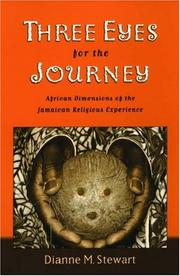| Listing 1 - 10 of 31 | << page >> |
Sort by
|

ISBN: 0195175573 0195154150 9780195154153 9780195175578 Year: 2005 Publisher: Oxford: Oxford university press,
Abstract | Keywords | Export | Availability | Bookmark
 Loading...
Loading...Choose an application
- Reference Manager
- EndNote
- RefWorks (Direct export to RefWorks)
Book
ISBN: 9780814762288 Year: 2011 Publisher: New York : New York University Press,
Abstract | Keywords | Export | Availability | Bookmark
 Loading...
Loading...Choose an application
- Reference Manager
- EndNote
- RefWorks (Direct export to RefWorks)
Creolization--the coming together of diverse beliefs and practices to form new beliefs and practices--is one of the most significant phenomena in Caribbean religious history. Brought together in the crucible of the sugar plantation, Caribbean peoples drew on the variants of Christianity brought by European colonizers, as well as on African religious and healing traditions and the remnants of Amerindian practices, to fashion new systems of belief. Creole Religions of the Caribbean offers a comprehensive introduction to the syncretic religions that have developed in the region. From Vodou, Santería, Regla de Palo, the Abakuá Secret Society, and Obeah to Quimbois and Espiritismo, the volume traces the historical-cultural origins of the major Creole religions, as well as the newer traditions such as Pocomania and Rastafarianism. This second edition updates the scholarship on the religions themselves and also expands the regional considerations of the Diaspora to the U.S. Latino community who are influenced by Creole spiritual practices. Fernández Olmos and Paravisini-Gebert also take into account the increased significance of material culture--art, music, literature--and healing practices influenced by Creole religions. -- Product Description.
Book
ISBN: 1283060647 9786613060648 9047432703 Year: 2008 Publisher: Leiden ; Boston : Brill,
Abstract | Keywords | Export | Availability | Bookmark
 Loading...
Loading...Choose an application
- Reference Manager
- EndNote
- RefWorks (Direct export to RefWorks)
The anthropology and history of African American religious formations has long been dominated by approaches aiming to recover and authenticate the historical transatlantic continuities linking such traditions to identifiable African source cultures. While not denying such continuities, the contributors to this volume seek to transcend this research agenda by bracketing “Africa” and “African pasts” as objective givens, and asking instead what role notions of “Africanity” and “pastfulness” play in the social and ritual lives of historical and contemporary practitioners of Afro-Atlantic religious formations. The volume’s goal is to open up contextually salient claims to “African origins” to empirical scrutiny, and so contribute to a broadening of the terms of debate in Afro-Atlantic studies.
Afro-Caribbean cults. --- Africa --- Caribbean Area --- Religion. --- Afro-Caribbean religions.
Book
ISBN: 9060119878 Year: 1997 Publisher: Zutphen Walburg pers
Abstract | Keywords | Export | Availability | Bookmark
 Loading...
Loading...Choose an application
- Reference Manager
- EndNote
- RefWorks (Direct export to RefWorks)
"Informative dissertation looks at formal and informal repression of Tambu and consequences of this repression for Afro-Antillan cultural life. The repression provoked open and hidden rebellion, and changed the character of Tambu; yet Tambu was never completely eliminated on Curaçao. Includes one-page, poorly translated summaries in English and also Papiamentu. Careful editing would have enhanced the readability of this study"--Handbook of Latin American Studies, v. 58.
Afro-Caribbean cults --- Persecution --- Tambu (Cult) --- History --- Curaçao --- Religion.
Book
ISBN: 9780226122625 022612262X 9780226122762 022612276X Year: 2014 Publisher: Chicago (Ill.) : University of Chicago press,
Abstract | Keywords | Export | Availability | Bookmark
 Loading...
Loading...Choose an application
- Reference Manager
- EndNote
- RefWorks (Direct export to RefWorks)
The word "possession" is anything but transparent, especially as it developed in the context of the African Americas. There it referred variously to spirits, material goods, and people. It served as a watershed term marking both transactions in which people were made into things - via slavery - and ritual events by which the thingification of people was revised. In Spirited Things, Paul Christopher Johnson gathers together essays by leading anthropologists in the Americas that reopen the concept of possession on these two fronts in order to examine the relationship between African religions in the Atlantic and the economies that have historically shaped - and continue to shape - the cultures that practice them. Exploring the way spirit possessions were framed both by material things - including plantations, the Catholic church, the sea, and the phonograph - as well as by the legacy of slavery, they offer a powerful new way of understanding the Atlantic world. -- from back cover.
Afro-Caribbean cults. --- Spirit possession --- Blacks --- Afro-Caribbean cults. --- Blacks --- Spirit possession. --- Afrokaribischer Kult. --- Besessenheit. --- Religion --- Religion. --- Latin America.
Book
ISBN: 9780226019420 022601942X 9780226019567 022601956X Year: 2013 Publisher: Chicago (Ill.) : University of Chicago press,
Abstract | Keywords | Export | Availability | Bookmark
 Loading...
Loading...Choose an application
- Reference Manager
- EndNote
- RefWorks (Direct export to RefWorks)
Afro-Caribbean cults. --- Afro-Caribbean cults. --- Afrokaribischer Kult. --- Blacks --- Blacks --- Religion. --- Religion --- Religion. --- Cuba --- Cuba. --- Kuba. --- Religion.

ISBN: 1135958815 1280406984 0203900103 9780203900109 9780415926454 0415926459 9780415926461 0415926467 9781280406980 0415926459 0415926467 9786610406982 6610406987 9781135958817 9781135958763 9781135958800 1135958807 Year: 2000 Publisher: New York : Routledge,
Abstract | Keywords | Export | Availability | Bookmark
 Loading...
Loading...Choose an application
- Reference Manager
- EndNote
- RefWorks (Direct export to RefWorks)
Paget introduces the general reader to Afro-Caribbean philosophy in this ground-breaking work. Since Afro-Caribbean thought is inherently hybrid in nature, he traces the roots of this discourse in traditional African thought and in the Christian and Enlightenment traditions of Western Europe.
Philosophy, Black --- Philosophy. --- Mental philosophy --- Humanities --- Black philosophy --- Afro-Caribbean cults --- Philosophy --- Philosophy, Black - West Indies --- Afro-Caribbean cults - Philosophy --- West Indies. --- Karibik. --- Westindien. --- Schwarze.
Book
ISBN: 0670590657 Year: 1973 Publisher: New York : Grossman Publishers,
Abstract | Keywords | Export | Availability | Bookmark
 Loading...
Loading...Choose an application
- Reference Manager
- EndNote
- RefWorks (Direct export to RefWorks)
Ifa --- Ifa (Religion) --- Ifa (Religion). --- Fa (Religion) --- Ifa (Cult) --- Afro-Caribbean cults --- Cults --- Ifa.
Book
ISBN: 0333637771 Year: 1995 Publisher: Houndmills, Basingstoke, Hampshire : The Hague : Macmillan ; In association with the Institute of Social Studies,
Abstract | Keywords | Export | Availability | Bookmark
 Loading...
Loading...Choose an application
- Reference Manager
- EndNote
- RefWorks (Direct export to RefWorks)
Afro-Caribbean cults --- Rastafari movement --- Cultes afro-antillais --- Rastafarisme --- Congresses. --- Congrès --- Afro-Caribbean religions
Book
ISBN: 9781683403722 9781683403838 Year: 2023 Publisher: Gainesville University of Florida Press
Abstract | Keywords | Export | Availability | Bookmark
 Loading...
Loading...Choose an application
- Reference Manager
- EndNote
- RefWorks (Direct export to RefWorks)
"Through a variety of first-person accounts, this book offers a glimpse into the frequently misunderstood religions of Afro-Cuban Lukumi̹, Haitian Vodou, and Brazilian Candomble̹, adding to the growing research on the transnational yet personal nature of African diasporic religions"-- "First-person accounts that show the expanding demographics of African-descended religions In this focused portrayal of global dispersal and spiritual sojourning, Martin Tsang draws together first-person accounts of the evolving Afro-Atlantic religious landscape. Spirited Diasporas offers a glimpse into the frequently misunderstood religions of Afro-Cuban Lukumi̹, Haitian Vodou, and Brazilian Candomble̹, adding to the growing research on the transnational yet personal nature of African diasporic religions. In these accounts, practitioners from many origins illustrate the work and commitment they undertook to learn and become initiated in these traditions. They reveal in the process a variety of experiences that are not often documented. Their perspectives also show the expanding contemporary demographics of African-descended religions, many of whose members identify as LGBTQ or are part of other minoritized populations, and they counter inaccurate and often racialized portrayals of these religions as being anti-modern and geographically limited. Through the voices of the professionals, scholars, and activists gathered here, readers will appreciate the purpose and belonging to be found in the far-reaching communities of these Latin American and Caribbean spiritualities. As the seekers in these stories discover and come home to their new religious families, Spirited Diasporas displays the relevance and generative power of these traditions."--
Black people --- Afro-Caribbean cults --- Religion --- History --- Religious life and customs --- Atlantic Ocean Region --- History.
| Listing 1 - 10 of 31 | << page >> |
Sort by
|

 Search
Search Feedback
Feedback About UniCat
About UniCat  Help
Help News
News